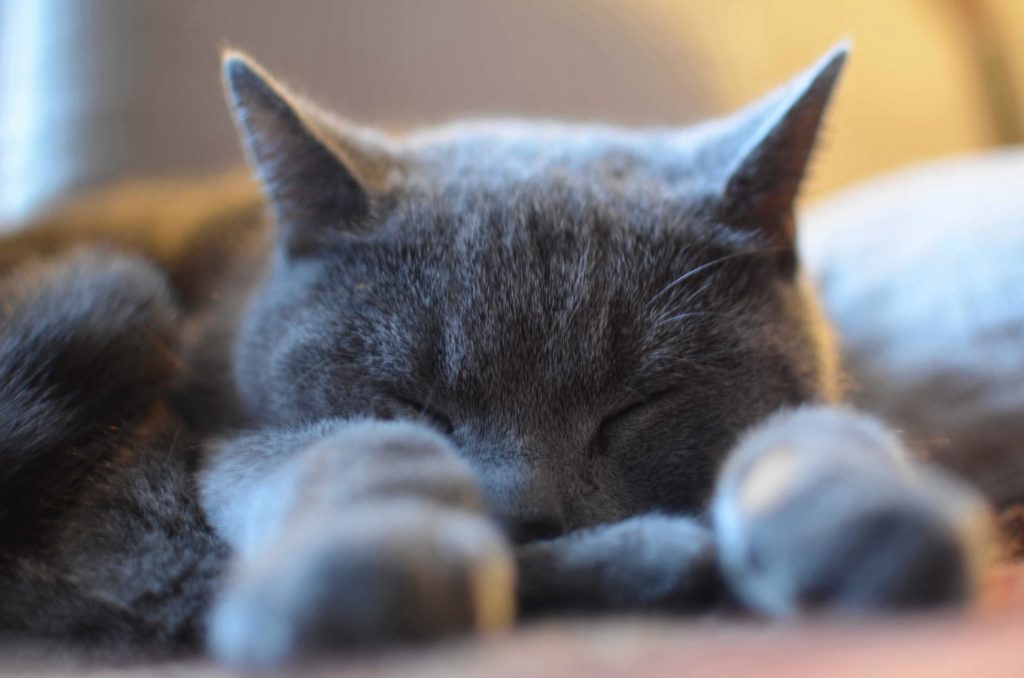Russian blue cats are the best attractive cat breed. They are loyal, friendly, intelligent, social. If you are thinking about adopting one for your children’s then they are just perfect. But, do they meow a lot or not? If you are also thinking the same then this is the right place.
Go through the whole article!
Do Russian Blue Meows a Lot?
Yes! Russian Blue is very vocal. She will use her voice to communicate with her owner if she is hungry, if she wants to play, or snuggle. A cat’s meow is a way to tell you that she is trying to communicate with you, that she wants your attention.
However, if your Russian Blue is not exposed to human speech when she was a little kitten, she may not meow. Generally, kittens are capable of making little squeaks and peeps, rather than full-throated meows. They will learn to meow from their mother or from being around humans.
Normally, cats are not vocal to other adult cats. Little kittens make squeaky noises to let their mother know they are hungry, but once they grow old, they don’t meow at cats, they meow just at humans.
Cats also yowl. Yowling is similar to meowing, but the sound is a little more drawn and melodic. Unlike meowing, adult cats yowl at each other, especially during breeding seasons.
Besides, if your Russian Blue is vocal, it only means she wants to talk with you. It’s hardly surprising that Russian Blue meows a lot because Russian Blue is very social and often seeks attention. Also, there are other reasons for the Russian Blue’s meowing. To find out, keep reading!
Reasons Why Russian Blue Meows?
Russian Blue meows for various reasons- to say hello, to ask for things, to let their owner know something is wrong, or for other common reasons such as:
To Demand Attention
Cats love social interactions with people, and in their demands for affection, some can be very vocal.
Russian Blue may want to be stroked, played with, or simply spoken to. If you leave your Russian Blue alone for a long period each day, she will meow for attention.
To Greet People
You can expect your Russian Blue to meow for greeting when you come back home, or when she meets you in the house, or when you speak to her.
To Ask for Food
Cats love to eat and can be demanding during their mealtime.
Whenever you enter the kitchen, your Russian Blue Cat might learn to meow, just in case there may be food. Also, she may meow to wake you up to serve her breakfast. Even, she can beg you to give her food by meowing.
To Let You Know What She Wants
Meowing is the primary way for a cat to let you know what she needs. If your Russian Blue wants to go outside, she will learn to meow at the door. If she wants to come in, she will meow to let you know she wants to come in.
Moreover, if you are trying to move a cat from being indoor-outdoor to living solely indoors, you will hear a lot of meowing of your cat at the doors and windows. This is a huge transition for your cat, so it may take a few weeks or even months to stop her meowing.
To Find a Mate
Cats that are more likely to yowl are reproductively intact. Women yowl to advertise their receptivity to men, and men yowl to gain access to women.
Aging
Old cats usually suffer from mental confusion or cognitive dysfunction. And, they meow when they become disoriented- a common symptom of cat’s Alzheimer disease.
So, it is your responsibility to understand what your cat is trying to tell you. She is not always asking for food or attention. Sometimes, there can be something serious going on with your Russian Blue. You just can’t ignore your feline.
Why Does My Russian Blue Meows At Night?
Cats are widely known as night owls. Once you switch off your light, cats start sprinting around the house. It’s a kind of cat version of dog zombies. Sometimes, cats meowing can be very disruptive and it can get in the way of your beauty sleep.
If your Russian Blue meows at night, and you are wondering like, why? Then, let’s know the reason here:
Cats are Naturally More Active during Night-Time
Cats are naturally active during certain hours of the night. Even, most people think that cats are nocturnal, but that’s strictly not true. Instead, they are crepuscular– it means they are most active at dusk and dawn, naturally.
Although cats do adapt to the routine of their owner, however, being crepuscular, they are active at the early hours of the morning when the rest of the house is sleeping.
Moreover, if your Russian Blue is young, she will be more active at night, because her instincts will tell her it’s time to hunt. Nonetheless, as she grows older, she will eventually adapt to your routine and will meow very less at night.
Your Russian Blue May Be Bored or Unstimulated
Cat meowing/crying at night can indicate that she is bored, or is not tired enough to get rest. If you play with your Russian Blue just before bedtime, she will get tired out at night and will rest. Also, it is very important to keep her mind active and happy.
Besides, a cat meowing at night can be attention-seeking behavior. It is crucial to attend to your cat’s needs, however, try not to give attention often because this may lead her to ask frequently.
Aging
Just as I said above, elderly cats usually suffer from mental confusion or cognitive dysfunction. And, they meow when they become disoriented. It directly affects the aging cat’s brain and can show lots of symptoms, and meowing at night is one of them.
Outdoor Cats Can Feel Trapped
If your Russian Blue is an outdoor cat during the day and you keep her indoors at night, she will feel trapped, and there is a fair chance that she will be meowing at night.
You can try installing a cat flap and letting her go out at night if it is safe so that, she is free to use her energy outside. Nonetheless, exposing cats to the outside environment at night is risky, so you must be careful and take the required preventive measures.
Overactive Thyroid or Kidney Disease
If your Russian Blue meows regularly at night, it’s a good idea to visit a veterinarian to check her welfare. Excessive vocalization including at night may be a symptom of an overactive thyroid or kidney disease in cats.
Yowling Can Be the Sign of Mating
Extremely loud screeching and cat’s yowling at night can be the sign of mating. Although this is a natural behavior, I suggest you neuter your cat. It avoids cat’s yowling at night as well as reduces the number of unwanted kittens.
What Causes Excessive Vocalization of My Russian Blue?
Although meowing is normal, excessive meowing can be very serious. One of the most common causes of excessive vocalization is attention-seeking.
To show their willingness to go outside or be fed, many cats learn to meow. This strategy is particularly effective early in the morning or at night. You can fulfill the demand of your cats to stop the offending noise.
Moreover, when your Russian Blue wants attention, she will continue to vocalize for your attention, even if you tried to ignore her.
Not only that, the presence of a medical or more severe behavior disorder can also be demonstrated by excessive vocalization. When your Russian Blue is in pain or having neurological problems or sensory disabilities, such as hearing or vision loss, she can meow excessively.
Fear, aggression, anger, cognitive dysfunction, hyperthyroidism, feline hyperesthesia syndrome, or other behavioral issues can also cause Russian Blue to vocalize excessively. Is your Russian Blue in the heat? If she is, she won’t stop meowing.
How Can I Treat Excessive Vocalization?
Treatment of any of the problems depends upon the underlying problem. If you think there are some behavioral issues, take your Russian blue to a veterinarian.
If your vet confirms that there are no health issues, then maybe your Russian Blue is seeking more attention. You can increase your cat’s mental and physical enrichment to eliminate the problem.
Besides, even by giving needed enrichment and attention, your cat continues to meow, then you can reward your Russian Blue with a treat for sitting quietly in front of you. In that way, meowing can be controlled.
People also suggest to ignore your cat if she meows too much, but I won’t suggest you ignore your feline. Rather, I suggest you know the cause and find treatment accordingly.
Also, if your Russian Blue Cat is at the end of her life, she will constantly meow and yowl. Sadly, at such time, all you can do is give love and attention to your feline.
Some Related Questions:
Do Cats Understand Human Meows?
No! Cats cannot understand human meows. To them, it just sounds like other human languages. And, this is because, the human cannot make exact meows like cats make, also each meows sound is different.
Is Russian Blue Crying a Bad Sign?
People believe that a cat crying at night in front of an ill person’s home is a sign that death is imminent. Usually, cats have been linked to witchcraft and evil spirits. So, if a cat cries at night, people still think that something bad is going to happen in someone’s home.
Nevertheless, I believe it’s just that your cat wants attention or enough food.
How Should I Say My Russian Blue That I Love Him?
Give your Russian Blue everything that keeps her happy. Use interactive toys to play with her, give her comfortable beds, provide scratching pads, give her hiding spots, snuggle her, and even slow blinking is a way to tell your cat that you love her.





